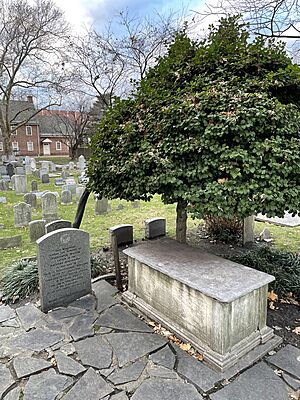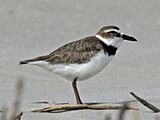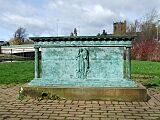Alexander Wilson (ornithologist) facts for kids
Quick facts for kids
Alexander Wilson
|
|
|---|---|
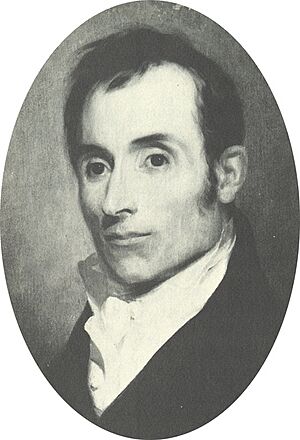
Alexander Wilson
|
|
| Born | July 6, 1766 Paisley, Scotland
|
| Died | August 23, 1813 (aged 47) Philadelphia, Pennsylvania, United States
|
| Nationality | Scottish-American |
| Scientific career | |
| Fields | naturalist |
| Signature | |
Alexander Wilson (born July 6, 1766 – died August 23, 1813) was a Scottish-American poet, ornithologist (someone who studies birds), naturalist, and illustrator. He is often called the "Father of American Ornithology" and is seen as one of the most important American bird experts before Audubon.
Contents
Biography
Early Life and Work
Alexander Wilson was born into a family in Paisley, Scotland, on July 6, 1766. His father was a weaver. Alexander had some schooling, but he also spent time looking after farm animals. When he was thirteen, he started working as an apprentice with his brother-in-law. He also worked for four years as a journeyman, which means he traveled around selling goods. In his free time, he enjoyed shooting grouse.
Poetry and Moving to America
While working as a weaver in Paisley, Wilson became very interested in writing poetry. He was inspired by the famous Scottish poet Robert Burns. Wilson also became good friends with another poet from Paisley, Ebenezer Picken.
Wilson wrote poems about different topics, including the lives of weavers. In 1792, he wrote a popular poem called "Watty and Meg: A wife reformed." He also wrote a poem that criticized a mill owner, which caused him some trouble. Because of these issues and the fact that he didn't spend much time on his weaving job, Wilson lived in poverty. In 1794, he decided to move to America for a new start.
From Teaching to Studying Birds
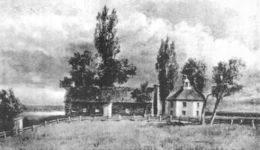
Wilson left Scotland in May 1794 and arrived in Delaware. He then walked to Philadelphia, where he tried working in printing and weaving. Since there weren't many jobs for weavers in Philadelphia, Wilson started teaching.
He taught at the Milestown School in Philadelphia for five years, from 1796 to 1801. After that, he taught briefly in New Jersey.
Eventually, Wilson found a teaching job in Gray's Ferry, Pennsylvania, and lived nearby in Kingsessing. There, he met a famous naturalist named William Bartram. Bartram encouraged Wilson's growing interest in ornithology (the study of birds) and painting.
Wilson decided to create a collection of drawings of all the birds in North America. He traveled widely to collect and paint different birds. He also found people to help pay for his big project. This led to his nine-volume book, American Ornithology, which was published between 1808 and 1814. This amazing work included illustrations of 268 bird species, and 26 of them had never been described before! His detailed drawings of birds in natural poses inspired many other artists and naturalists, including James Audubon.
In 1813, Wilson was chosen to be a member of the American Philosophical Society, a well-known group for thinkers and scientists.
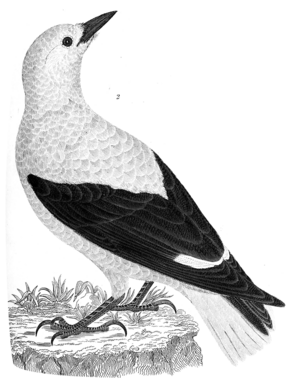
Later Life and Death
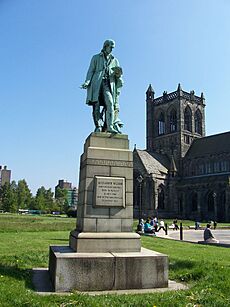
Alexander Wilson passed away on August 23, 1813. Reports say he died from illness, being overworked, and living in poverty. He was buried in Philadelphia at the cemetery of the Gloria Dei (Old Swedes') church. The last two volumes of his American Ornithology were finished by his friend, George Ord.
A drawing by Thomas Sully from 1828 shows someone mourning at Wilson's grave.
Legacy
In Paisley, Scotland, where Wilson was born, a statue of him stands near Paisley Abbey. There is also a memorial by the River Cart that remembers his connection to the city. It says, "Remember Alexander Wilson 1766–1813. Here was his boyhood playground."
A group of warblers (a type of bird) was once named Wilsonia in his honor, though that name is not used anymore. Several bird species were also named after him, including the Wilson's storm-petrel, Wilson's plover, Wilson's phalarope, Wilson's snipe, and Wilson's warbler. In 2023, the American Ornithological Society decided to give new names to Wilson's warbler and Wilson's snipe.
Wilson's meeting with James Audubon likely encouraged Audubon to publish his own famous book about birds. Wilson's work also influenced many other artists and bird experts who came after him.
The Wilson Journal of Ornithology, a scientific magazine about birds, and the Wilson Ornithological Society are also named after him.
Gallery
-
Wilson's plover (Charadrius wilsonia)
-
Memorial in Paisley near the River Cart
See also
 In Spanish: Alexander Wilson para niños
In Spanish: Alexander Wilson para niños
- List of 18th-century British working-class writers


